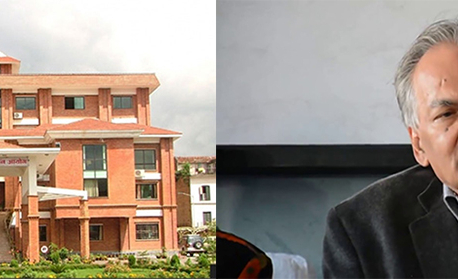
OR
Tribhuvan University has been in the news this week again, again not for good reasons. Most of the candidates to pass written examinations of Tribhuvan University Service Commission (TUSC) have been the close relatives of politicians linked mostly with ruling Nepal Communist Party or top officials of the university. In the recently published results of TUSC exam conducted for nearly 100 posts of professors, mostly candidates close to the ruling party have been promoted to professors. Complaints have been registered at Commission for the Investigation of Abuse of Authority (CIAA) and National Vigilance Center against the result. A person with merit and competence can get through TUSC exam. Everyone who made it through the exam may not be undeserving candidate. But when majority of examinees passing this rather tough exam happen to be relatives of politicians, it certainly raises question mark on transparency and fairness with which such a sensitive exam should be conducted and its results published. Likewise, TUSC is also found to have promoted the university’s controversial registrar Dilli Ram Upreti to the post of professor. A probe panel had found Upreti, among other officials, guilty of irregularities while issuing affiliations to private medical colleges a few years back, and had recommended action against him. In February, Medical Education Probe Commission (MEPC) headed by former justice Gauri Bahadur Karki had recommended action against various officials including Upreti. Besides, Upreti reportedly does not have a PhD degree which is considered customary for promotion to professorship at the university.
There is a room to suspect a foul play because Chaitanya Sharma, who is the chair of TUSC, is a man of open political affiliation. He had contested the last parliamentary election from the then CPN-UML. Thus Sharma, as the suspicion goes, may have influenced results of TUSC. Nepali political parties of every hue have found it convenient to spoil the academic environment of the universities just to appease their cadres and loyalists. Often they have appointed party loyalists regardless of their academic qualification and merit and promoted those to the posts of professors without considering whether and how many research papers and articles they have published in the academic journals. Even the person implicated in plagiarism charges has been favored (current Vice-Chancellor is found to have committed plagiarism).
TU must take a radical shift from these anomalies if it is to grow as the real center of learning. And for this, it must be allowed to choose whom it recruits as lecturers and professors and other administrative and managerial staffs based on merit and competence rather than political affiliation of the candidates. Foul play has been suspected in TUSC exam results. CIAA must look into this matter, without heeding any influence-peddling by political parties. If necessary, TU authority should be directed to reconduct the exam if irregularities are proved. For long, Nepal’s oldest university has earned the notoriety of being the platform for political parties to recruit their cadres. And this is precisely what has tarnished its national and international image. TU, which used to be the revered institution of higher learning in Nepal and beyond, must be saved from going further downhill. It’s already getting too late to take necessary steps against this.
You May Like This

Prosecute Raj Narayan Pathak
Raj Narayan Pathak, one of the commissioners at Commission for the Investigation of Abuse of Authority (CIAA), who resigned on... Read More...

Years on, CIAA still struggles to collect Joshi case documents
KATHMANDU, June 25: In what appears to be maintaining poor records of important documents, the Commission for the Investigation of Abuse... Read More...

Case of corruption filed against NEA accountant
KATHMANDU, March 18: The Commission for Investigation of Abuse of Authority (CIAA) has filed a case of corruption at the... Read More...




Just In
- Health ministry to conduct ‘search and vaccinate’ campaign on May 13
- Indian customs releases trucks carrying Nepali tea, halted across Kakarbhitta
- Silent period for by-election to begin from midnight
- SC issues short-term interim order to govt and TU not to take immediate action against TU legal advisor Khanal
- National consultation workshop advocates to scale up nutrition smart community in Nepal
- Patan High Court issues short-term interim order to halt selection process of NTB’s CEO
- NEPSE inches up 0.15 points; daily turnover increases to Rs 2.53 billion
- Bagmati Govt mandates tri-lingual signboards in offices














Leave A Comment